Confucius said a long time ago: “Let the ruler be ruler, ministers ministers, fathers fathers, sons sons1.” Sure, we hyphen-Americans still see our Eastern cousins as authentic (read: too simple to lie), but it strikes true. It speaks to an intuition many people might hold about ourselves and our place in society and the wider world. I’m not talking about “fitting in” with the normies, that’s relatively easy to do so as long as you have the cash flow for the necessary shoes, haircut, and sex partner.
No, I’m talking about those unspoken little hierarchies we make up that form the basis of our us v. them recognition. Those visceral feelings of recognition or disgust, based on unfair stereotypes and prejudices society requires us to hold. It’s not just the Trump voter who gets a little nervous when his Hispanic co-worker brings up politics. It’s also the middle-class professional who assumes she has a new gay best-friend because of the voice and his discerning eye for fashion. It’s the lefty who feels weird at his girlfriend’s favorite dive bar because people with jerseys who drink Miller Lite don’t read Adorno. It’s the Bernie 2020-er who can’t help hold onto his Balenciaga bag a little tighter when a young Black kid squeezes by him on the subway. “Admitting you have a problem is the first step to healing.”
Everyone does it — no, that doesn’t mean it’s right. But labeling people, and ourselves, is how we make sense of the world and our place in it. It’s a way of filling the many gaps in the world, and understanding our own place within it. Even the most antiquated labels hang around like ghosts, haunting every bride who demands a wedding worthy of a princess —after all, who are we to tell a Queen she has no right to her throne?
So, what is the ruler without someone to rule? What is the son without a father? Without dad’s stern looks the boys would run around barefoot, with no-one to yell at them when they kick a football through some old lady’s window. No rules — no order in a world of chaos.
I.
Jordan Peterson is an easy character to mock, especially if you’re convinced snark isn’t a maladaptive trait. In the post-50’s world, the Father archetype he plays is in real trouble; impotent, afraid of being emasculated, a pitiful laughing stock that screws up everything. Indeed, Jordan Peterson in many ways represents exactly everything the Father is mocked for. The rebellion of the generations before us against the violent American patriarch was so successful that Homer Simpson became his iconic representation2.
But that was the 90’s, back when cutting-edge TV mocking staid social values was a taboo thrill that made you feel like you weren’t the only sane person in the world. TV was considered low-brow, trashy, something for the plebiscite to vegetate to—a perfect medium for misfits, weirdos, and Jews to make cartoons about how working a job was a bummer. Now such content is pedestrian, expected—in fact, high-brow literature has spent the last decades cribbing television’s curt visual language and oh-so-quotable dialogue. You might watch Family Guy and feel more alone — it’s all cynical jabs, everyone’s a jerk, not even holding the pretense of being something more than Fox’s billion dollar cow. Likewise, the Simpsons doesn’t bother with stodgy humanisms no more. An oppressive cynicism looms over every single TV program. The useless emasculated dad is no longer subversive commentary as it was in 1955, now it’s just common sense.
So the Father is in real trouble. Where does that leave the Son? Your biological dad is at work most of the time, and when he’s home he’s probably re-watching Breaking Bad while sipping on a micro-brew. He doesn’t really get why you spend that many hours on your computer anyway, or who you’re talking to while you stay up gaming ‘till four in the morning. Mom tells you she doesn’t think it’s healthy as she heats up the dinner she got on the way home from work. One of the great accomplishments of the American economy’s division of labor was to make raising children the responsibility of mass media industries, freeing up parents’ valuable productive hours for the economy. School is a part of this system too—administrators and state bureaucrats are complicit in the division between schools that produce future productive college graduates, and schools that produce future inmates.
Maybe it’s true that surrogate Fathers are nothing new; thanks to our screens, never before has he felt more real than he does now. Jordan Peterson lectures you, he answers Skype calls, he even has a tear in his eye when he tells you to get your act together and you know he means it because his voice is cracking. He’s not a dad, he’s a Father. An entrepreneur sees what’s missing in the world and seizes on the opportunity, and what else is Jordan Peterson but the marketplace response to a world without Fathers?
II.
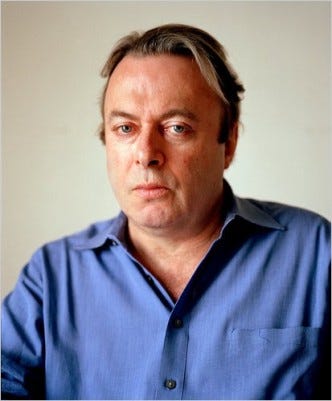
I don’t blame you for thinking this is the prelude to a long, blue-balled rant about patriarchal masculinity falling apart in our culture. I’m sorry, it’s not. Fear of living in a “sissified, pussified3” world is as old as the fear of being cuckolded by a superior male — see the Epic of Gilgamesh (2100BC) if you’re curious about the latter. It is perhaps part of the masculine imperative to seek independence from the world, but this seems to contradict the role of the father; “independence is for children,” Jordan says. “Take on responsibilities, have a job and a family,” he goes on. “Clean your room, for God’s sake.” This doesn’t sound like the life of a pirate in Neverland.
I’m writing this to make a simple observation about you, the consumer. In our post-industrial world, culture is an extension of the media industry which responds to the signaling of the consumer. And of course, we’re all consumers. The Che Guevara shirt is an old joke at this point. No Logo has comfortably given way to the Right Logo. When the self-styled masculinist isn’t selling you his book or asking for Patreon money, he’s smoking cigars or eating steak or hoarding eggs or wearing a suit or abstaining from soy or throwing away his Gillette razor to buy a Schick — let’s be clear, there’s indeed a masculine crisis and like all crises in the age of consumers, it’s a crisis of consumption.
The Father, who watches the Son sit behind his computer with muted disdain, is ill-equipped to face today’s society where social change is distributed through the cloud (and thus ultimately controlled by it). Of course, we’re all as anxious as the Father is, stuck in a depressive option-paralysis, trying to dull the terror of being through videogames & weed & pornography. Or at the very least, that is considered the acceptable way to express our grievances. But the Father who fears the pussification of his world refuses the dominant mode of cultural production on Twitter — after all, isn’t coming together to bond over shared experiences of pain & humiliation a girly thing? To want alternatives is no crime.
But ultimately, the masculinists make the same mistake the feminists make, which is to assume that Homer Simpson is a sign the American patriarch has lost his power. Now that he cannot beat his wife, or force his children to work the farm, his former subjects are free to fulfill their desires and participate in the marketplace. But this confuses the personal for the political. Isn’t it strange how corporations replicate not only the structure but also the culture of the American patriarch? They demand so much, and become indignant if you seem ungrateful. They want you to give, but you can’t just clock in—you have to really want it! Big personalities dominate — convinced they’re holding up the weight of the world as their word of law travels through the corporate hierarchy.
Rulers after all always left the beating and oppression to the subordinates, who can tell the crying moms and dads in the HR department that they’re just doing their job. Doesn’t matter the pain and misery it causes—”I’m just doing my job.” Ecce homo — but identifying with Pontius Pilate. The grand American patriarch hasn’t abdicated, he just realized the dad was an inefficient tool — when even your phone is applying crippling social pressure, it’s hard to remember what it was dads were supposed to do in the first place. Simply put, the Father himself is a victim of America’s division of labor.
III.
There are many who scratch their heads thinking about incels, hikikomori, and their predecessors who used to patronize Star Trek conventions and collect comic books. Socially-awkward losers have always existed in society, but their engagement on the Internet created a unique parallelism. Now the incel becomes the Incel, free to create his own subculture, and thus his own identity. And the incel’s identity is that of the disappointed child who wears his failure on his sleeve, decrying that indeed the “blue pill” content he’d been offered by the media that he’d been raised on and consumed ever since seems to offer little guidance or inoculation from the pain of living in the world. On the stage of the world on which the Freudian play is acted out, the Incel is the rebellious child who revolts against his Father’s regime by shitting himself.
On the other end of the glass, we watch the Incel with disgust & curiosity. Many might relate to their failures with romance, their rock-bottom self-esteem, and maybe even their pessimism. However, they also give us an out-group that appears to welcome its own debasement. “Look at these dangerous losers,” finding common ground with the Incel — you both agree that he’s pathetic. “I’m not like them,” how refreshing that the Incel knows his place. It’s a strange kind of stability. Now the Incel becomes himself a commodity ready to be consumed, as if surrendering himself to the creature which spawned him.
But consumption doesn’t satisfy — in fact, there’s an incentive to keep you wanting more. The Incel believes he’s missed out on all the important experiences of the life denied to him, but he only believes this because the media he consumes has become inseparable from his world view. It’s not just pornography — longing to touch the soft JAV babe on the screen. It’s all those old ideas about love & success longing around in the cultural aether too. The Incel has taken the implicit message of the media around him to heart — he is missing out, and it’s all his fault. Click here to see more; and every click just sinks the dagger more and more. Why can I buy everything with my parents’ money except happiness? Why do these young women on social media seem so much happier than me?
I think part of the shock & fascination with Incels is how they seem to embody so well our fears & anxieties about media (mass, social, etc.) and our consumption of it. The Incel’s main problem seems to be that he takes the world too seriously, accepting too strongly the worldview his consumption provides him. Yes, it’s true that some men fuck more women than others and sure, of course we live in a culture dominated by looks & money and yeah, if you don’t have either you better get real good at something and even then you might end up alone in life — but cheer up, it ain’t all that bad! Anyway, just be yourself. All you need to do is just catch up on the confusing and often contradictory rules governing social engagement that you’ve missed out on for decades. Look, we’re all angry and confused and depressed, but we all decided a while ago without you what the proper way of expressing that is.
The Incel’s cousin, the Red Pill4 dude, changes his consumption habits from anime & porn to guides & forum-posts with questionable credibility. In a way, he’s a parody of consumption; he wants to consume women, such is his revenge against consumerism. He gobbles up all the information he can about pick-up techniques and the true nature of women. He has a surrogate Father too, the lecherous old creep who stands by the entrance of the mall insisting women love hearing his compliments. He’s buying pamphlets called “BANG,” and generating content for others to consume. Reddit’s staff might disavow their views, but web-traffic fueled by users autonomously creating content is blind like justice. Regrettably, the Red Pill dude might be the proto-Influencer.
‘Cuz you see, consumption is not just accumulating things because we enjoy them for their physical & sensual qualities. It’s social capital too — Instagram has an entire economy fueled by people who market directly to their envy-filled followers. We live in the age of the Influencer, who is approachable enough to be trustworthy yet a little bit out of reach just to give us something greater to aspire to. The Red Pill dude laid down the scheme—approachable and thus trustworthy with his earthy, homespun tru-isms about women, but aspirational with all that pussy he’s bagging. Wanna be like me? The Paypal link is in the description.
Those hierarchies I mentioned at the start? Think of how much it ties into your consumption. Facebook learns a lot by harvesting your likes, and companies pay top dollar for access to your data. It shouldn’t surprise you that political affiliation and economic status are easy to infer from that stuff. We’ve all become content creators too, posting our selfies and hot-takes for everyone else to consume — a tiny high for every sliver of recognition we can get trying to ascend the great vertical ranks of society. A successful brand is something everyone would want to buy.
It’s not just denied jouissance5 that cause the Incel and the Red Pill dude to obsess, it’s also the status and its relevant lifestyle that’s being denied to them6. I’m consuming what I’m being told to consume but it’s not doing anything. The lonely, consumptive kid stuck in his own mediocrity is our era’s unique contribution to the ancient art of tragedy. A hug-less, kiss-less virgin looks even more pathetic if he’s posing next to a Lambo in Gucci. Why are women so much better at this than me? They just need to look pretty.
IV.
May we now acknowledge the Father-shaped hole in our consumption? We so privilege presence, we rarely note the existence of an absence. Jordan Peterson himself very astutely validates this absence by invoking the Father archetype, not just casting him as the spirit of civilization but stepping into his shoes too. You don’t have to take his word for it, the success of his supposedly-grassroots effort to get daddy back is revealing enough of a demand in the marketplace. I’m not joining the choir here, just pointing out that this stuff sells. (When I wrote this, I was incapable of predicting that ‘daddy’ would morph into Andrew Tate; the violent, masculine father who rejects the pussifying responsibilities of modern life to live in a child’s fantasy of fast cars, cigars, chess, and easy women. He wants to make Neverland real.)
But Jordan Peterson cucks himself, and he perhaps does this strategically. His dad shtick hits a dead end when it comes to giving his audience of budding prodigal sons a reason for that absence so strongly felt. The post-modern neomarxists, the atomizing hammer of identity politics, the shrill & unlovely feminists, those freaky college kids with their ideas about gender & identity — a vague confederacy of malcontents threatening to take down Western civilization. We’re up against forces we cannot withstand. For Jordan, The Gulag Archipelago has become a Gnostic document, a key to seeing the Manichean spectres not only haunting Europe but American HR departments too. It’s compelling as all conspiracies are, but is it convincing?
Of course we can share a laugh about lobsters in private. But think it through, all the way through, and something interesting reveals itself. Peterson’s intention with this analogy was that natural hierarchies exist, which is such an obvious observation that it borders on trivial. Simultaneously however, Peterson bemoans the abuse of power from the institutions he critiques — drawing on Soviet & Nazi tropes to wag a finger at these supposed authoritarian brutes.
If I could attend his talks, I would ask: “what’s more top erect lobster than using dominance & oppression in the race to the top? Didn’t the cultural Marxists and feminists win the evolutionary struggle fair & square? Wasn’t the Father just… weak!” Well no, the commies and the Nazis can’t win. That just feels unfair. Forget evolution and what it did to crustaceans. When Peterson talks about natural hierarchies, he just means our intuitions about where we belong and the expectations that come along with it. The single feeling that binds much of his fan-base together—the shy boys, incels, fail-sons, and even disillusioned undergrads & drop-outs—is that they are stuck waiting for that mythic adulthood all sons long for.
Peterson’s main fixation has always been sex, the sex of men & women, Fathers & Mothers; before the dragons, lobsters, and transgender teens, he eulogized the masculine 1950’s dad. He describes a future where Fathers are made obsolete, needed neither in the family nor in the workplace. Sons no longer becoming Fathers. The ending is a grim punchline: “that’ll keep the testosterone going.” It’s a markedly different mood from the encouraging dad who helps you clean your room. But the message is the same: “without Fathers, who will produce Sons?”
As Peterson tells it, now we have impotent dads, not Fathers, which raise weak sons. In this erectile-dysfunctional society, daughters are looking for sex from the few virile men left on Earth—maybe from more primitive cultures in which masculinity is still guarded safely by institutions. They might even call them Daddy. With the Father made obsolete, no-one’s setting the rules about monogamy and women only want the top males. Pareto distributions apply and enforced monogamy is the only option. From that perspective, he asks a fair question: why should boys even participate in this society and become good men if women won’t fuck them7?
But what broke down those social norms? Who made Fathers obsolete? I won’t pretend I have the answer, but think back to your childhood. Before the pronouns and secret Marxism, your dad was probably there. If he was like mine, he probably fell asleep watching Star Trek after a very hard day of work as you stayed up past your bed-time. Homer Simpson and Abe Simpson were on the TV screen, and the kids at school traded lines from South Park. Be honest — between your parents and the TV, who captured your attention more? When your dad is dead and long-gone, how will you comfort yourself? Will you watch that episode of the Simpsons, in which Homer comforts Lisa after she loses her male role-model? Will you cry bitter tears as I do, when Homer says that in Lisa’s bright future as an important and respected grown-up, he’ll just be the good-for-nothing loser serving the drinks? Adulthood is learning to forgive your dad for his weakness; it’s not his fault he was born into poverty.
But what does the Father bequeath the Son in this post-Feminist apocalypse? For a very few of them, a lot of money, enough to construct their own Neverland fantasy to consume. For the rest of them, the Son is only left with the consumption habits his Father pioneered, whose demands pushed the technological innovations that form the wall of noise the Son surrounds himself with. TV, videogames, food at any moment you want it, boobs and pussy on tap; a comfortable life of leisure without struggle—Son, he really did it all for you. Indeed the natural hierarchy has been disturbed by these great innovations — the Son need no longer be a Son, he could even be she or they, and not every son knows what do with this newfound freedom. Feeling thus unwanted, he withdraws into a internet-enabled catatonia, decrying the state of society on Twitter between bouts of Fortnite and nostalgia-inducing YouTube videos.
But the Father is still haunting him. He is still there. The Son feels His disapproving gaze even in the privacy of his own room, even though he longer has a physical presence8. Chaos follows in the wake of a absence, and chaos feels shitty. All the promises made to him turned out to be empty, and now you can reach thirty and still feel that adulthood is firmly beyond your grasp. So the poor kid does what he’s always done, what his daddy did — he consumes something. And it is this original sin the Father bequeaths his Son.
I am thy father’s spirit,
Doom’d for a certain term to walk the night,
And for the day confin’d to fast in fires,
Till the foul crimes done in my days of nature
Are burnt and purg’d away.
Hamlet (I.5.745)
Analects 12.11.
Try to tell me there isn’t a little bit of Homer Simpson in every “boomer” joke.
“The act, or process, of a man being shamed, taught, lead, pastored, drugged or otherwise coerced or cajoled into throwing out his brain, handing over his balls and formally abandoning the rarefied air of the testosterone-leader-fog that God and nature hardwired him to dwell in, and instead become a weak, effeminate, mangina sporting, shriveled up little pussy.” — Doug Giles, dweller of the testosterone-leader-fog.
The militant wing of the pick-up artistry community attracts many incels because it turns misogyny & sexual frustration into a fun activity you can share on social media. If you’re really smart, you can even turn it into a small business. And then your father will respect you, maybe.
The incel’s consumption turns sexual desire into a fetishistic commodity. For a more analytic reading of that desire, I should direct you to https://mcrumps.com/2019/01/31/the-thing-that-the-incels-desire/
An incel perceives himself as an angel fallen from grace, Elliot Rodger even describes himself as “cast out and rejected.” The fallen angels in the Book of Enoch suffer a similar fate after they become enamored with human women. The significance of this is left as an exercise for the reader.
That’s not to say anyone should be forced to fuck men. It’s true, Man is condemned to be free. That is the parable of the Fall of Man from the Garden of Eden. But the whole point of the redemption of man after the Fall is what he chooses to do with that freedom. Hopefully more than just complain about women.
“I present Genesis 1, which presents the idea that a pre-existent cognitive structure (God the Father) uses the Logos, the Christian Word, the second Person of the Trinity, to generate habitable order out of pre-cosmogonic chaos at the beginning of time” — in case you were wondering how Peterson’s Christianity ties to all of this.

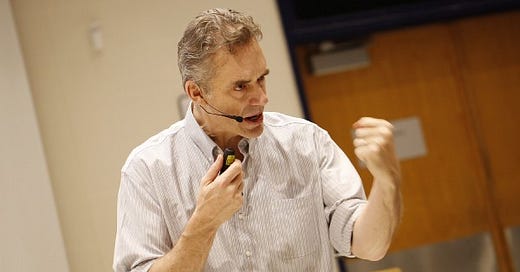



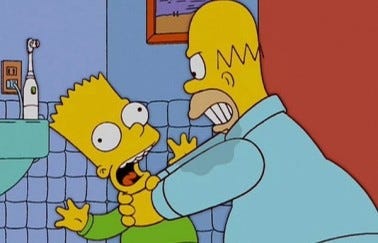
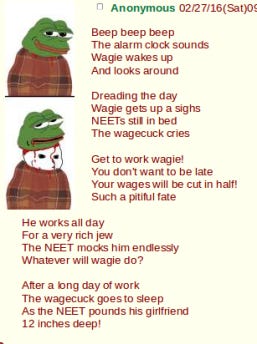

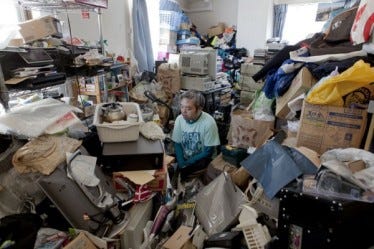

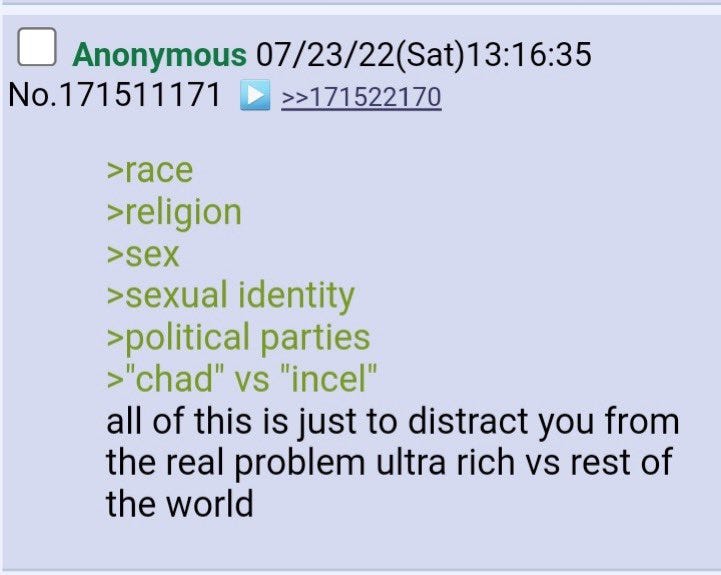

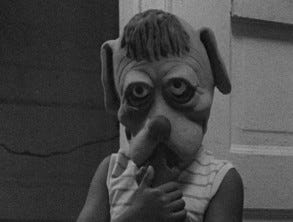
Cons: Not as self indulgent as I’d like it to be as someone who did not have their father present for majority childhood
Pros: I feel his warm looming presence more than ever in my childhood !